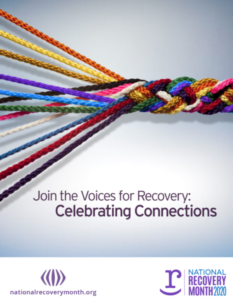It’s fair to say that National Recovery Month couldn’t have come at a better time; millions of Americans are struggling with addiction and mental illness—inside the rooms of recovery and out. We have to remind men and women that help is available, and that substance use treatment and mental health treatment works.
The last six months have been exceedingly challenging for countless Americans. What’s more, it will probably take years to quantify the impact of SARS-CoV-2. Tens of millions have lost their jobs, causing enormous financial strain at home. Many of us have lost loved ones or live in fear of losing someone dear. Moreover, the emotional stress packed into coming face to face with a pandemic has severely affected people living with addiction and mental illness.
The COVID-19 pandemic continues to affect countless people around the globe. To date, 26 million cases have been reported worldwide, and as many as a million individual lives are lost. Sadly, the United States continues to have the highest figures. Some 6.12 million Americans have tested positive, and we’ve lost almost 200,000 men, women, and children to the virus.
COVID-19 is a traumatic event on a global scale. Just as people turned to drugs and alcohol during the Great Recession and the Hurricane Katrina tragedy, the same is proving true right now with the pandemic.
Dr. Nora Volkow, director of the National Institute on Drug Abuse (NIDA), sounded the alarm months ago about a rise in drug use and overdoses. The head of NIDA also said she was “hearing the distress calls from throughout the country” regarding relapses among those that had already achieved recovery.
Mental Health Disorders and Addiction During The Pandemic
The Centers for Disease Control and Prevention (CDC) conducted a survey towards the end of June. Yahoo News reports that the pandemic was a factor leading to increases in alcohol use and depression cases. Researchers found 40.9 percent of participants had one or more adverse mental or behavioral health conditions.
The CDC survey showed that 31 percent struggled with anxiety or depression. Compared to the same time last year, anxiety symptoms increased threefold and depression fourfold. The survey indicates that 26 percent of participants had symptoms of trauma- and stress-related disorder.
Perhaps most salient, the CDC points out that lockdowns and overburdened healthcare systems make it challenging for state and local governments to respond to the uptick in mental and behavioral health disorders. The authors write:
Addressing mental health disparities and preparing support systems to mitigate mental health consequences as the pandemic evolves will continue to be needed urgently.”
Mounting Relapse and Overdose Crisis
Dr. Volkow’s announcement that opioid overdoses may have increased 30 to 40 since the pandemic began is reflected in separate data-gathering projects. The Overdose Detection Mapping Application Program (ODMAP), located at the University of Baltimore, confirms that drug overdoses are spiking across the country, NPR reports. ODMAP found that 60 percent of participating counties reported an increase in drug overdoses.
Data from more than 1,200 agencies nationwide submitted to ODMAP shows that overdoses have increased by roughly 18 percent. What’s more, many communities are in dire need of assistance to address the spike. The ubiquity of fentanyl makes a desperate situation even worse—particularly for those in recovery who lack tolerance for the potent opioid. For such individuals, a relapse can be a death sentence.
Jennifer Austin, a substance abuse disorder coach, points out that men and women in recovery depend upon structure and fellowship. Naturally, state and local-mandated lockdowns have made working a program of recovery troublesome for many individuals. Isolation is not a friend to recovery.
The longer people had to isolate it was relapse, relapse, overdose, relapse, overdose,” Austin tells NPR. “I’ve had people who I’ve never worked with before reach out to me and say, ‘Jen, what do I do?'”
According to the CDC, roughly 72,000 Americans died from an overdose in 2019, a five percent increase from the previous year. 2020 is likely going to be even worse; ADM Brett Giroir, Assistant Secretary for the U.S. Department of Health and Human Services (HHS) says:
Every indication we have in terms of stress, in terms of surveys about increasing [drug] use during the pandemic, basically everything is pointed in the wrong direction.”
National Recovery Month
This year has been a trying one for all of us, but there is still time to make a difference. National Recovery Month is an annual observance to support people in recovery. Experts come together every September to educate Americans about substance use treatment and mental health services; both enable people living with mental and substance use disorders to “live healthy and rewarding lives.”
Throughout the month, webinars are replacing the typical in-person seminars to protect the well-being of participants. 2020 is National Recovery Month’s 31st observance; this year’s theme is, “Join the Voices for Recovery: Celebrating Connections.” Please click the links for more information on webinars and events. We can all have a role in spreading the word about recovery at home using social media.
“Join the Voices for Recovery: Celebrating Connections,” reminds people in recovery and those who support them, that we all have victories to celebrate and things we may wish we had done differently. This is true of everyone and, as in most cases, we cannot do it alone.
Addiction Recovery Center for Men
National Recovery Month is an ideal opportunity to reach out for support. If you or an adult male loved one requires assistance with addiction or mental illness, please contact PACE Recovery Center today to learn more about our programs. Our highly skilled team utilizes evidence-based therapies to help men get on the road toward lasting recovery.



